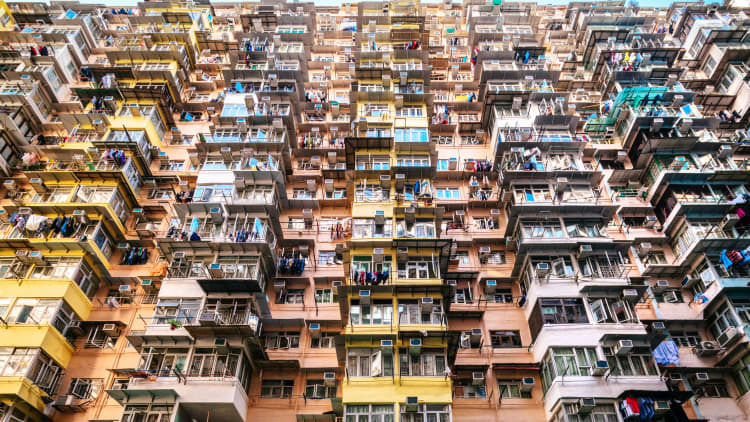
Hong Kong was recently ranked the most expensive housing market in the world for the seventh consecutive year, according to the annual Demographia International Housing Affordability Survey.
The survey, which divides median house prices by gross annual median household income, found Hong Kong to clock in at 18.1. So, on average, if someone makes $50,000 in annual income, the cost of their home would be $900,000.
The 18.1 multiple soars above other markets around the world. The second least affordable city is Sydney which scored a multiple of 12.1. Even financial hubs London and New York pale in comparison coming in at multiples of 8.5 and 5.9 respectively.
So what makes Hong Kong so expensive?
Low Supply, High Demand
On one hand, Hong Kong's housing astronomical costs area a simple case of supply and demand. The city ranks as the fourth most densely populated among sovereign states or territories , with more than seven million residents spread across 1,106 square kilometers (427 sq miles).
Meanwhile, there's high demand to live and work in one of the world's financial hubs and the de-facto access point into the world's most populous country, China.
Added to that, there's very little developable land left in Hong Kong, as liveable land is squeezed between bodies of water and soaring mountains.
Mainland developers are driving up costs
The land that is able to be developed is mostly controlled by the government, which offers land to developers behind the scenes by tender.
The land is selling for record amounts, increasingly to Chinese mainland developers, which in turn are likely to command record high prices for buyers for apartments and rental spaces built.
Recently, two Chinese developers paid a record $2.17 billion for a plot of residential land, which exceeded market valuations by almost 50-percent, according to South China Morning Post.
Meanwhile, Hong Kong's government controls nearly half of the total supply or housing through public housing rentals and assisted home ownership purchase programs, which are intended for lower-income families. Meaning, just about half of the housing market is available on the private market.
Land sales and revenue
It's no secret Hong Kong is one of the most tax-friendly economies in the world. One of the reasons the government can keep taxes so low is because a large chunk of its revenues come from land sales.
If property values drop, the government can't generate as much revenue, meaning there's little incentive to seriously curb Hong Kong's cost of housing.
In fact, if property values dropped too much, the government could even have to rethink its tax revenue system.
The silver lining may be this: While Hong Kong's housing prices aren't likely to decrease anytime soon, the multiple of cost of housing to gross annual median income actually declined from 2015 to 2016, going from 19 to 18.1, according to Demographia.


